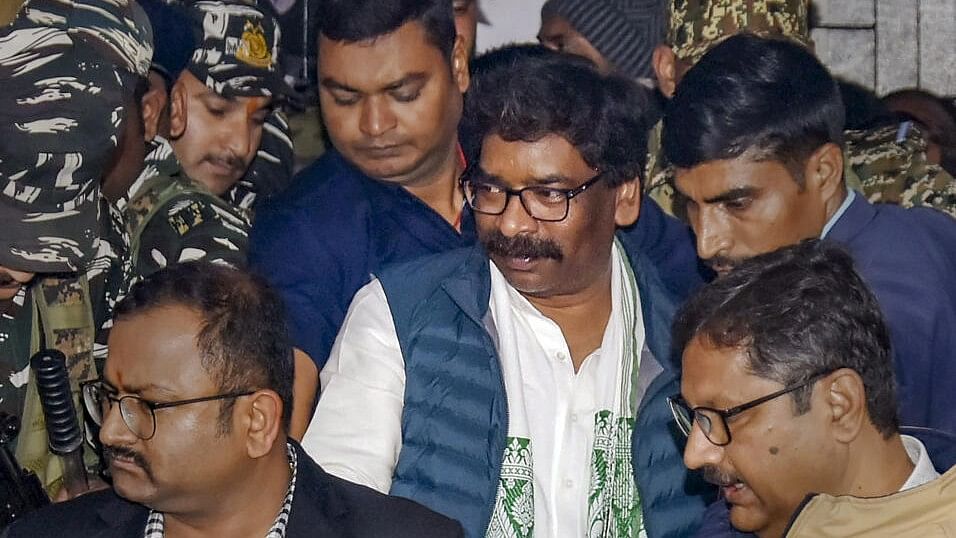
Former Jharkhand CM and JMM leader Hemant Soren being taken to custody by Enforcement Directorate (ED) officials after he was produced before a PMLA court in a money laundering case, in Ranchi.
Credit: PTI Photo
Soon after the change of government in Bihar, caused by none other than the state’s chief minister, neighbouring state Jharkhand has also had a change, forced on the chief minister by an outside agency. While Nitish Kumar shifted his allegiance to the BJP, Hemant Soren resigned as chief minister just before the Enforcement Directorate (ED) arrested him on charges of money laundering. The BJP benefits from the shift of Nitish Kumar but the political balance sheet in Jharkhand is still not clear. The ED has been pursuing a case against Soren, accusing him of acquisition of properties on the basis of forged documents. The need for arrest in such a case has been debated, but having received no relief from the courts, Soren decided to step down. The PMLA (Prevention of Money Laundering Act), under which the case is being investigated, gives almost absolute powers of arrest to the ED. Arrests are difficult to avoid and bail is difficult to get under this law. Soren is in the ED’s custody now.
Soren is among the opposition leaders across many states being investigated by the ED on various charges falling under the draconian PMLA. Soren may or may not be guilty of the charges against him, but the question of why only opposition leaders are being probed by the ED gets stronger with every arrest and case. Delhi Chief Minister Arvind Kejriwal may be the next target, as indicated by the persistent attempts of the ED to get at him. The politics in Jharkhand over the arrest of Soren does not seem to have ended either. A new ministry under Champai Soren has been sworn in. But Governor C P Radhakrishnan vacillated for a day before inviting him to form the government, after he was elected leader of the JMM. Champai Soren has been given 10 days to prove his majority. Though the JMM-Congress coalition in the state has a decisive majority, fears of poaching and horse-trading are pervasive, and ruling party MLAs have been shifted to Hyderabad for safekeeping. While all of this points to the BJP’s ability to break and make governments, it also shows the vulnerability of the opposition. It is a comment on the poor state of politics in the country.
The JMM has managed to make a leadership transition to Champai Soren, a senior leader with a clean record. The possibility of a transfer of power within the Hemant Soren family, on the Lalu-Rabri model, was mooted but it was averted from within the family itself. Political developments in Opposition-ruled states like Jharkhand and Delhi have specially become interesting because of the approaching Lok Sabha elections.